 ANGELUS TODAY
ANGELUS TODAY
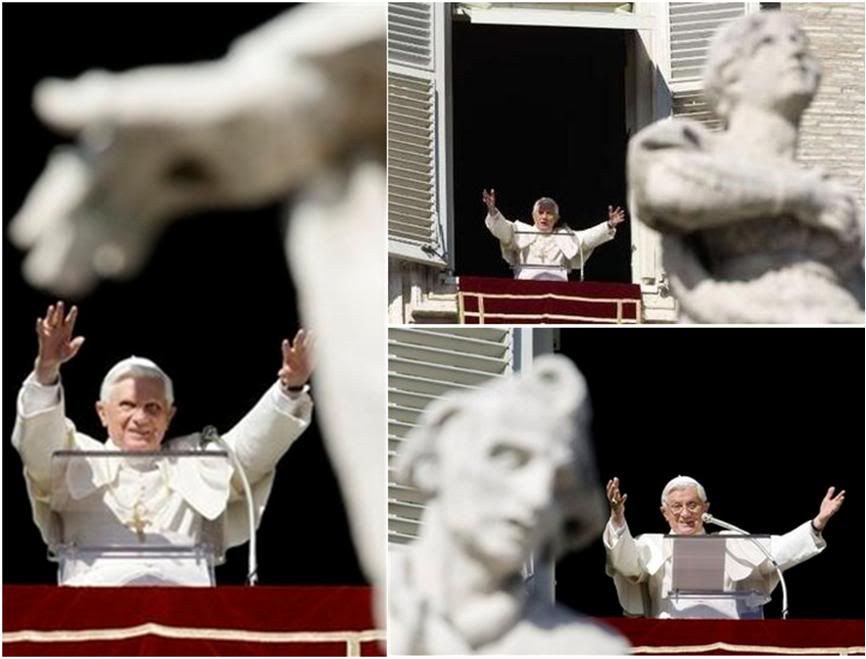
In his pre-Angelus mini-homily today, Pope Benedict XVI spoke of the significance of the feast of the dedication of the Basilica of St. John Lateran today.
After the prayers, he recalled the 70th anniversary today of Kristallnacht when the Nazis attacked Jews and their houses, businesses and synagogues, and said he prayed that everyone can commit themselves against anti-Semitism and all forms of discrimination.
He also recalled the 90th anniversary of the end of the First World War; called for an end to the conflict that has victimized a million and half refugees in the North Kivu region of the Congo; and said that on Thanksgiving Day in Italy today, the Church calls attention to growing hunger in the world.
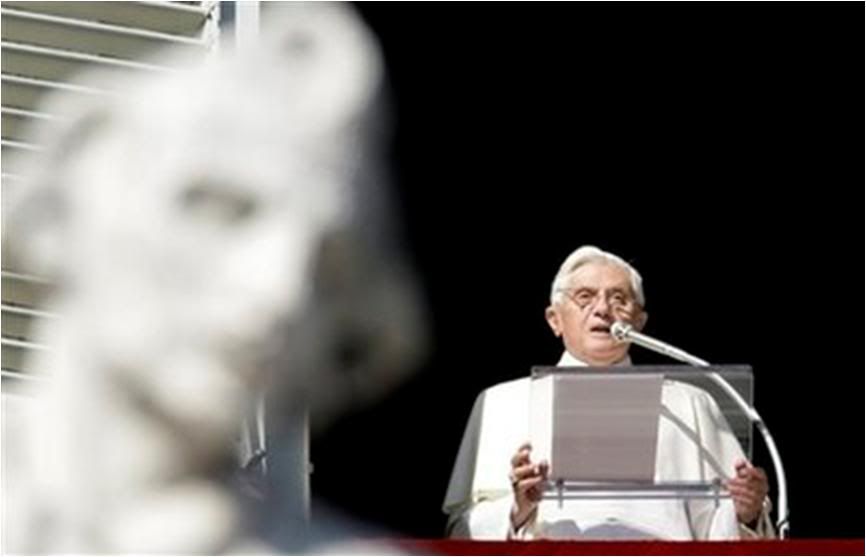 Here is a full translation of the Holy Father's words at the noontime Angelus today.
Here is a full translation of the Holy Father's words at the noontime Angelus today.
Dear brothers and sisters!
The liturgy today celebrates the dedication of the Lateran Basilica, called the "the mother and chief of all the churches of the Urbe (city) and the Orbe (world)".
Indeed, this Basilica was the first church built after the edict of Emperor Constantine in 313 which granted Christians the freedom to practise their religion. The emperor himself gave Pope Melchiades a property of the Lateran family, where he had constructed the Basilica, the Baptistery and the Patriarchy, that is, the residence of the Bishop of Rome, where the Popes lived until the Avignon exile.
The dedication of the Basilica was celebrated by Pope Sylvester around 324, and the temple was named for the Most Holy Redeemer. The titles of Saints John the Baptist and John the Evangelist, from which the church gets its familiar name, were added only after the 6th century.
This feast at first was of interest only to the city of Rome, but since 1565, it has been extended to all the Churches following the Roman rite. In honoring the sacred edifice, it is intended to express love and veneration for the Roman Church which, as St. Ignatius of Antioch said, 'presides in charity' over the entire Catholic communion (To the Romans, 1,1).
The Word of God on this solemnity recalls an essential truth: that the temple of bricks is a symbol of the living Church, the Christian community, which, already in their letters, the Apostles Peter and Paul understood as a 'spiritual edifice', constructed by God with the 'living stones' that Christians are, on the one foundation of Jesus Christ, compared in turn to the 'cornerstone' (cfr 1 Cor 3,9-11.16-17; 1 Pt 2,4-8, Eph 2,20-22).
"Brothers, you are God's building", St. Paul writes, and adds: "The temple of God, which you are, is holy" (1 Cor 3,9c.17).
The beauty and harmony of churches, destined to render praise to God, invites even us humans, with our limitations and sins, to convert ourselves in order to form a 'cosmos', a well-ordered construction, in close communion with Jesus, who is the true Saint of Saints.
This culminates in the Eucharistic liturgy, during which the 'ekklesia' - the community of baptized persons - are gathered to listen to the Word of God and to nourish themselves with the Body and Blood of Christ.
Around this double meal, the Church of living stones is edified in truth and charity, and becomes interiorly shaped by the Holy Spirit, becoming transformed into one that receives, conforming itself ever closer to its Lord Jesus Christ. The Church itself, if it lives in sincere and fraternal unity, thus becomes a spiritual sacrifice that is pleasing to God.
Dear friends, today's feast celebrates a mystery that is always actual: namely, that God wishes to build in the world a spiritual temple, a community that adores him in spirit and in truth (cfr Jn 4,23-24).
But this occasion also reminds us of the importance of the material edifices in which communities gather to celebrate the praises of God. Every community therefore has the duty to take good care of their own sacred edifices, which constitute a precious religious and historical patrimony.
Let us now invoke the intercession of the Most Blessed Mary so that she may aid us to become, like herself, the 'house of God', a living temple of his love.
After the Angelus, he had these special messages:
Today is the 70th anniversary of the tragic event [Kristallnacht - the night of glass-smashing] which took place on the night of November 9-10, 1938, when Nazi fury against the Jews was unleashed in Germany.
Businesses, offices, houses and synagogues were attacked and destroyed, and many persons were killed, opening the way to the systematic and violent persecution of German Jews which ended in the Shoah (Holocaust).
Even today I feel pain over what happened on that tragic occasion, the memory of which should serve to ensure that similar horrors are never repeated again, and that we should commit ourselves, at all levels, against every form of anti-Semitism and discrimination, educating above all the young generations in respect and reciprocal acceptance.
I invite you to pray for the victims then and to join me in showing profound solidarity with the Jewish world.
Disquieting news continues to come from the North Kivu region of the Democratic Republic of the Congo. Bloody armed encounters and systematic atrocities have resulted and continue to result in numerous victims among innocent civilians.
Destruction, sacking and violence of every kind have forced tens of thousands of persons to abandon even the little that they have in order to survive. It is estimated that there are now more than a million and a half refugees.
To all and to each of them, I wish to express my particular closeness, as I encourage and bless all those who are doing their best to relieve their sufferings, among which I must mention in particular, the pastors of the local Churches.
To the families who have lost loved ones, I extend my condolence and assure them of my prayers for the departed. Finally, I renew my fervent appeal so that everyone may work together to restore peace in that land that has been tormented for so long, with respect for the law and, above all, for the dignity of every human being.
Italy today marks Thanksgiving Day which this year is on the theme, "I was hungry and you fed me'. I join my voice to that of the Italian bishops who, with those words of Jesus, call attention to the serious and complex problem of hunger today, made more tragic by the rise in the cost of some basic foods.
The Church, even as it re-proposes the fundamental ethical principle that the goods of the earth have a universal destination [meant for everyone], puts this into practice, following the example of Jesus, with multiple initiatives of material sharing.
I pray for the rural world, especially the small farmers in the developing countries. I encourage and bless all who are committed to the task of seeing to it that no one lacks healthy and adequate alimentation. Whoever helps the poor helps Christ himself.
In his message to the French-speaking faithful, he said:
Let us pray to God, in these days that commemorate the 90th anniversary of the end of the First World War, for peace in the world and for all those who work for justice and brotherhood among men.
To German-speaking pilgrims, he repeated his remembrance of Kristallnacht, adding:
In memory of the victims, let us pray to the Lord for his assistance, so that we can work together in building a society in which men of different religions and races can live together in peace and justice.
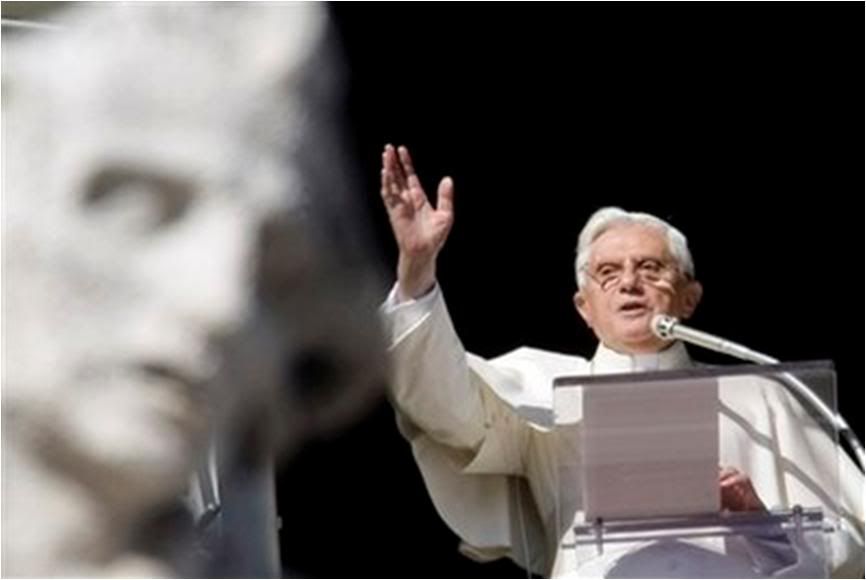 Pope speaks of 'pain'
Pope speaks of 'pain'
in remembering Kristallnacht

VATICAN CITY, Nov. 9 (AFP) – Pope Benedict XVI marked on Sunday the 70th anniversary of the Kristallnacht pogrom -- a prelude to the Holocaust -- by recalling the agony he felt as a boy growing up in Nazi Germany.
An unwilling member of the Hitler Youth who deserted the German army towards the end of World War II, the leader of the world's Roman Catholics, urged younger generations to shun all forms of discrimination.
Recalling the "sad events of the night of 9-10 November 1938, when the Nazi fury was unleashed against the Jews," the 81-year-old Pope said "even today, I feel pain for what happened in these tragic circumstances, of which the memory must serve to ensure that such horrors never occur again.
"Shops, offices, homes and synagogues were attacked and destroyed, and numerous people were killed, acting as the trigger for the systematic and violent persecution of German Jews which resulted in the Shoah," the Hebrew name for the Holocaust.
Benedict called on the world to "act, at every level, against all forms of anti-Semitism and discrimination, educating the younger generations in particular about the meaning of reciprocal respect."
He called on tens of thousands of pilgrims to "pray for the victims of yesteryear" and to "unite" in showing the Roman Catholic faith's "profound solidarity with the Jewish world."
The pogrom, also known as the Night of Broken Glass, saw Nazi thugs plunder Jewish businesses throughout Germany, torch some 300 synagogues and round up some 30,000 Jewish men for deportation to concentration camps.
Some 90 Jews were murdered in the orgy of violence.
The Pope last month backed the beatification of his controversial World War II predecessor Pius XII defending the wartime Pontiff's actions during a "complex historical moment."
His stance has sparked bitter debate and tension between Catholics and Jews.
[Excuse me! I think the bitterness is mostly on the part of those Jews who have somehow latched on to Pius XII as their scapegoat for the Holocaust. To read their comments, one would think the Pope alone was responsible for the Shoah, and that he is more despicable than Hitler himself. Offended Catholics are not bitter - we're just outraged, and not feeling too indulgent about this one-sided condemnation of Pius XII by people who refuse to consider any evidence that does not reinforce their prejudice. ]
Rabbi welcomes Pope's words
about Kristallnacht
Translated from

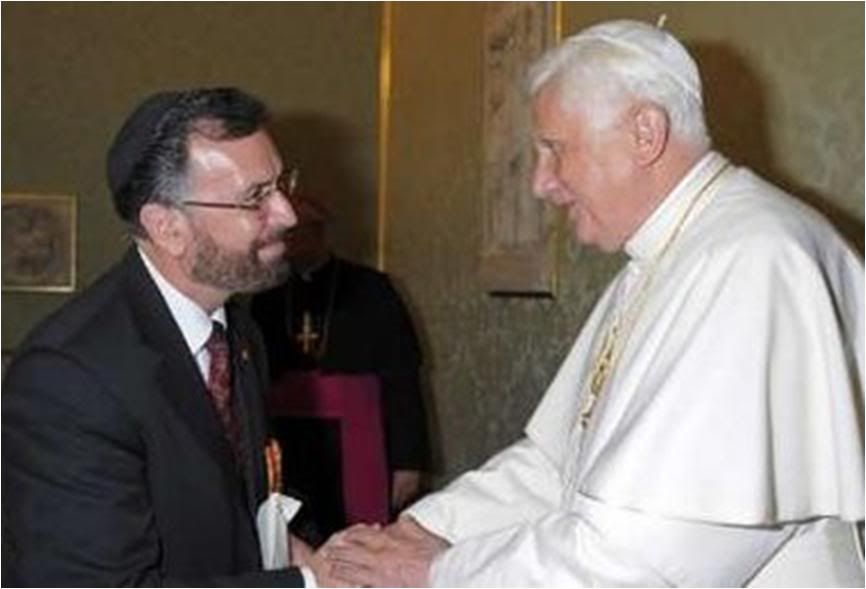
ROME, Nov. 9 (Translated from Apcom) - Ten days ago, Rabbi David Rosen was at the Vatican and asked Pope Benedict XVI to open the Vatican Archives on Pius XII, and later said he was 'disappointed' when the head of the Archives explained that this could not be done earlier than 6-7 years from now because the material is still being catalogued, digitized and organized.
Today in Budapest, Rosen welcomed Pope Benedict's words at Angelus today, remembering 'with pain' the 70h anniversary of Kristallnacht, when the Nazis first unleashed their fury publicly against German Jews, were 'very important' for Jewish-Catholic relations.
Rosen, who is president of the Jewish Committee for Inter-Religious Consultations, is in Budapest to attend a meeting between a Vatican panel headed by Cardinal Walter Kasper, president of the Vatican Commission for Religious Relations with the Jews, and the Grand Rabbinate of Israel.
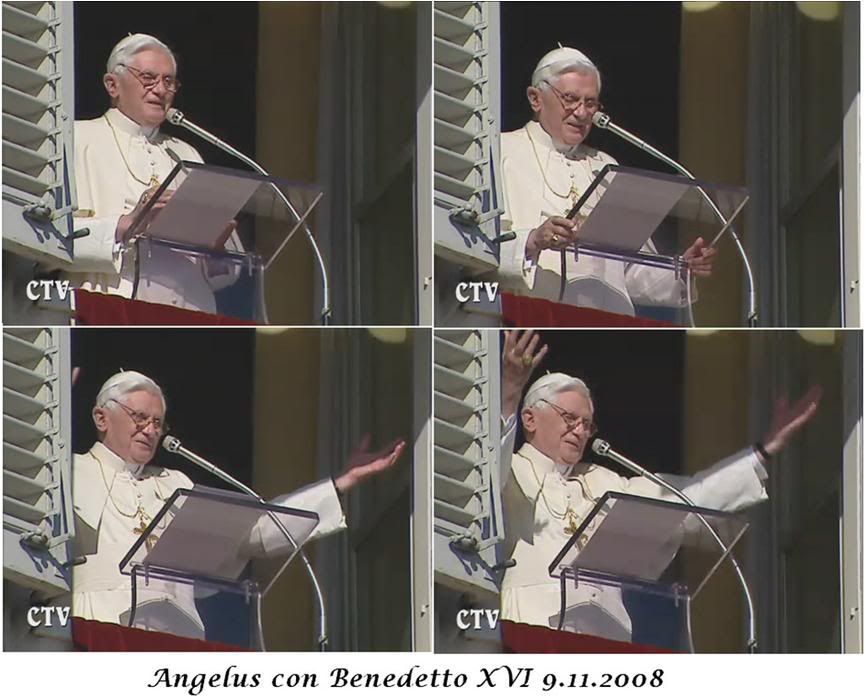 Thanks to Caterina: Part of her videocap montage from today's Angelus.
Thanks to Caterina: Part of her videocap montage from today's Angelus.
"Benedict XVI is a very consistent man," Rosen said. "The position he stated is very important."
[Being consistent, the Pope only said what he has said many times in the past about anti-Semitism. What else can one say about it anyway, except 'never again!
So it wasn't what he said that was newsworthy, I think, but that he chose to remember Kristallnacht 'in public', giving it priority importance in his supplementary Angelus messages, over the simultaneous 90th anniversary of the end of World War I. Would a non-German Pope have considered it the same way? I have to check back if John Paul II used the 50th anniversary of Kristallnacht in 1988 for a similar purpose.]
"He presents Nazism not just as a sin, as John Paul II did, but also as an attack against the very roots of Christianity itself," Rosen said.
He likes Benedict's formulation expressed on earlier occasions [most recently in Paris] that one cannot be a Christian and anti-Semitic at the same time.
Rosen was asked whether the Pope's words would help relationships between Jews and Catholics in the light of a new wave of polemics over Pius XII.
"Of course, it helps," he said. The work on historical memory will always be complicated between Jews and Catholics, and there will always be moments of tension, but these are disturbances within a relationship that is indisputably positive and constructive, and a partnership even that looks to the future."
He said proof of this was the bilateral meeting in Budapest, and that in fact, both delegations were planning a joint observance of the Kristallnacht anniversary later.
"The important fact," he said, "is what John Paul II said, which Benedict XVI has reiterated: we are working not just to repair the past but to learn from the past. Past tragedy is an educational tool for the future."
Rosen was asked to comment on Cardinal Bertone's statement Thursday that beatification was a religious matter internal to the Catholic Church, over which the Vatican has exclusive competence.
"Obviously," Rosen answered, "but if the Catholic Church says it wants a positive and respectful relationship with the Jews, then it is reasonable to expect that it will consider Jewish sensibility on the matter."
[It does and it will, but that does not mean the Church will allow uninformed or willfully misinformed Jewish sensibility to dictate what it will do about a Pope who is widely acknowledged to have been, at the very least, an extraordinary person and Pope.
If Pius XII ever becomes a Blessed One or a Saint, this concerns Catholics alone - the Church does not ask non-Catholics to venerate its saints, or to agree with who it considers saints: if others agree and/or venerate them, fine; if not, it takes nothing away from the Blessed One or Saint, or from the Catholic faith.]
As for Pope Benedict's denunciation yesterday of 'unilateral' interpretations of Pius XII's wartime actions, Rosen said, "There are certainly subjective interpretations on both sides about Pius XII".
[Of course. But the Church has the weight of historical evidence as objective fact to support its 'subjective' view of Pius XII, whereas his Jewish critics persist in ignoring all the positive evidence - testified to by their own people, including prominent Jews, at or near the time of the events in question - to concentrate on what he failed to do. The other thing is that in Rome, Rosen was quoted to have told a news conference that he asked for the opening of the archives on Pius XII, but not for the suspension of the beatification process because he personally did not share this demand.]
* * * * * * * * * * * * * * * * * * * * * * * * * * * * * * * * * * * * * * * * * * * * * * * * * * * * * * * * * * * * *
I've now read some 10-12 diffeent reports and commentary in the Italian press about the Holy Father's speech on Pius XII last Friday and not one of them picked up his reference to Pius XII as the 'immortal Pontiff' - so much so that I started to doubt my own memory and went back to the original text - and yes, the last clause of his last sentence about Pius XII, which starts with the phrase that calls him 'an exceptional gift from God', reads thus:
... auspico che si continui a riflettere sulla preziosa eredità lasciata alla Chiesa dall’immortale Pontefice, per trarne proficue applicazioni alle problematiche oggi emergenti.
Translation:
...I wish continued reflection on the precious legacy left to the Church by this immortal Pope, so that we may draw profitable applications to the problems that emerge today.
I was so struck at the time by his use of the word 'immmortal' that I commented on it. And yet, everyone else appears to be ignoring it, and I cannot figure out why.
Are they 'embarassed' that Benedict XVI would, so to speak, 'go out on a limb' like that about a Pope whose judgment and courage, at the very least, are contested by many, including some Catholics - and so, in their way, they are trying to 'protect' him from undue exposure to his critics? But anyone can read the full text online!
Interesting (and unnecessarily provocative) that one of the Italian reports claims that Mons. Sergio Pagano, head of the Vatican Archives, told the Jerusalem Post recently that he, too, thinks, the Church should suspend the beatification process on Pius XII until the archives of his Pontificate are made public.
Rather out of turn, I thought. Pius XII's Jewish critics could now use that statement to say, "Ah-ha! If even the head of the Vatican Archives thinks that, then he must be aware there is damaging material in there." Even if it could easily mean the opposite - that he knows the material will not turn up a smoking gun. Or even more simply, that he does not know what specific material there may be relative to this question but that he personally shares putting Pius XIXI's cause on hold.
[Modificato da TERESA BENEDETTA 10/11/2008 11:33]